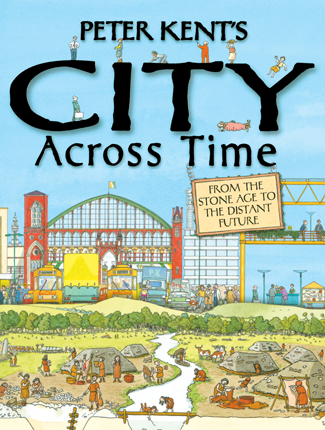| Peter Kent's city across time Author: Kent, Peter | ||
| Price: $22.38 | ||
Summary:
Cross-sections show how an early settlement changes into a bustling, modern-day city and reveal the prehistoric origins of the settlement, its 21st-century development and even give a glimpse into the far future, when ice sheets threaten to overwhelm the city.
| Accelerated Reader Information: Interest Level: MG Reading Level: 6.30 Points: 1.0 Quiz: 165232 |
Common Core Standards
Grade 2 → Reading → RI Informational Text → 2.RI Key Ideas & Details
Grade 2 → Reading → RI Informational Text → 2.RI Craft & Structure
Grade 2 → Reading → RI Informational Text → 2.RI Integration of Knowledge & Ideas
Grade 2 → Reading → RI Informational Text → 2.RI Range of Reading & Level of Text Complexity
Grade 2 → Reading → RI Informational Text → Texts Illustrating the Complexity, Quality, & Rang
Grade 2 → Reading → CCR College & Career Readiness Anchor Standards fo
Grade 3 → Reading → RI Informational Text → 3.RI Key Ideas & Details
Grade 3 → Reading → RI Informational Text → 3.RI Craft & Structure
Grade 3 → Reading → RI Informational Text → 3.RI Integration of Knowledge & Ideas
Grade 3 → Reading → RI Informational Text → 3.RI Range of Reading & Level of Text Complexity
Grade 3 → Reading → RI Informational Text → Texts Illustrating Complexity, Quality, & Range of
Grade 3 → Reading → CCR College & Career Readiness Anchor Standards fo
Grade 4 → Reading → RI Informational Text → 4.RI Key Ideas & Details
Grade 4 → Reading → RI Informational Text → 4.RI Craft & Structure
Grade 4 → Reading → RI Informational Text → 4.RI Integration of Knowledge & Ideas
Grade 4 → Reading → RI Informational Text → 4.RI Range of Reading & Level of Text Complexity
Grade 4 → Reading → RI Informational Text → Texts Illustrating the Complexity, Quality, & Rang
Grade 4 → Reading → CCR College & Career Readiness Anchor Standards fo
Reviews:
Kirkus Reviews (04/01/10)
School Library Journal (00/06/10)
Booklist (05/01/10)
Full Text Reviews:
Booklist - 05/01/2010 Kent offers a quick tour of modern civilization as seen through the archaeological lens of an imagined European city in this detail-rich picture book. Beginning in the Stone Age, each spread uses the same vantage point to show a cutaway snapshot of what the landscape and city would look like in each era. Structures get built up, then fall into layers of debris as the time frame moves forward and the base level of the city creeps steadily upward. It’s a winning format, and Kent knows how to provide the mini-dramas (a peasant being shoved by a nobleman into a stream in the sixteenth century becomes a skeleton buried beneath the stream in the seventeenth) that make it such a fun, flip back-and-forth experience. Short paragraphs accompany each spread to give broad generalizations about evolving building techniques and shifts in the daily lives of the cartoony inhabitants. A final spread envisions a distant future where a half-page of rubble lies buried beneath a sere landscape, ready for alien archaeologists to dig into and puzzle over. - Copyright 2010 Booklist.
School Library Journal - 06/01/2010 Gr 4–8— This intriguing introduction to urban archaeology features cross-sections of the same location in an imaginary European city from the Stone Age to the 21st century. Changes in daily life aboveground are fascinating, and what happens in the subterranean realm is equally engaging. As one civilization displaces another, skeletons, artifacts, and garbage form layer upon layer of an unwritten record. Kent supplies brief overviews of each era depicted for quick snapshots of history. In addition to glimpses of the same street in different centuries, spreads offer detailed depictions of a medieval silver mine, construction of the London Underground, and secret bunkers built during the Cold War. These interludes remind readers that past construction is evident beneath our feet and provide the materials studied by archaeologists. Whether students flip through the pages quickly or painstakingly compare certain elements in the underground layers from one color cartoon illustration to the next, they will gain a deeper appreciation for the way human settlements change over time. Anne Millard's A Street Through Time (DK, 1998) takes readers on another journey through urban history, although that volume lacks the underground and archaeological components of Kent's work.—Kathy Piehl, Minnesota State University, Mankato - Copyright 2010 Publishers Weekly, Library Journal and/or School Library Journal used with permission.



